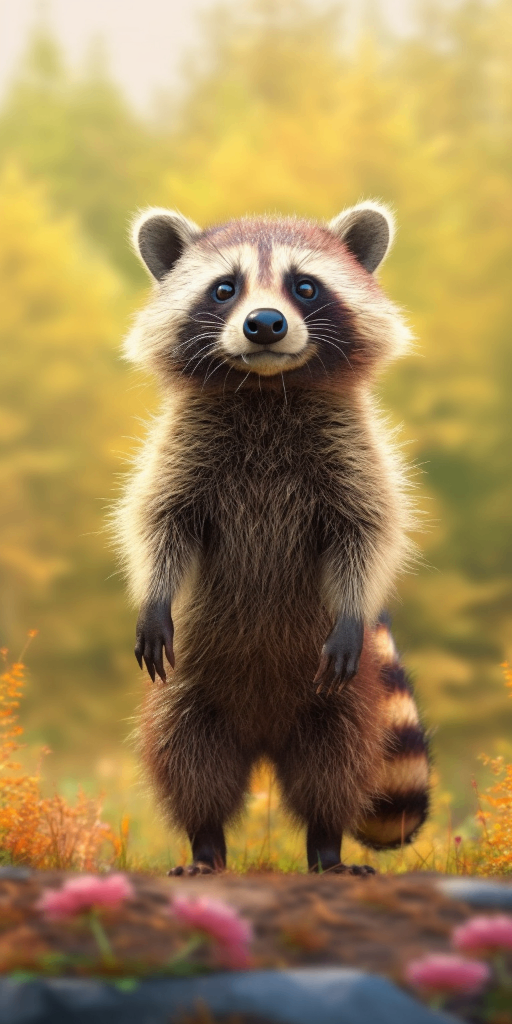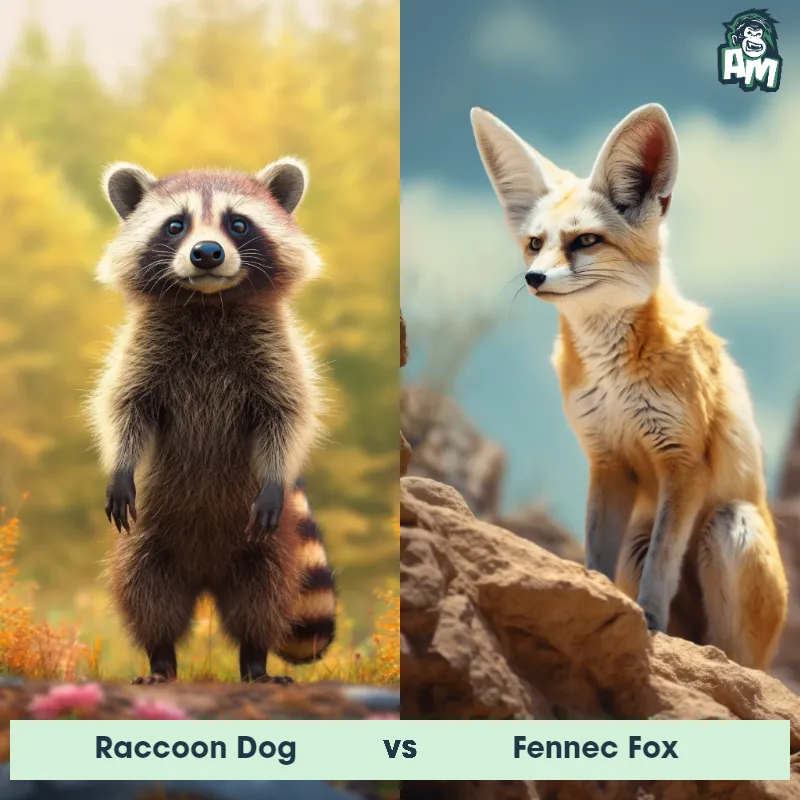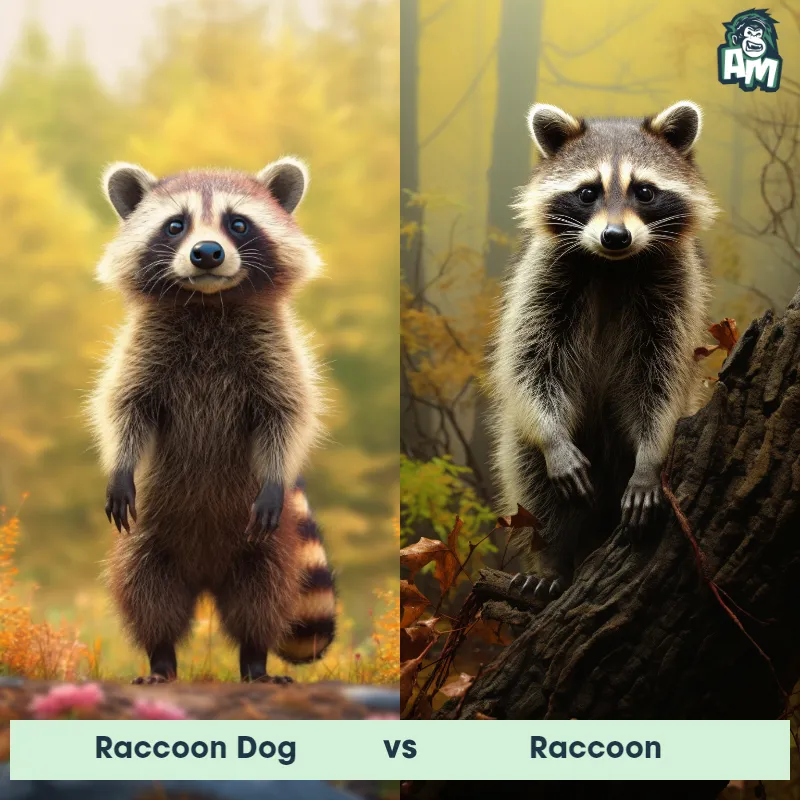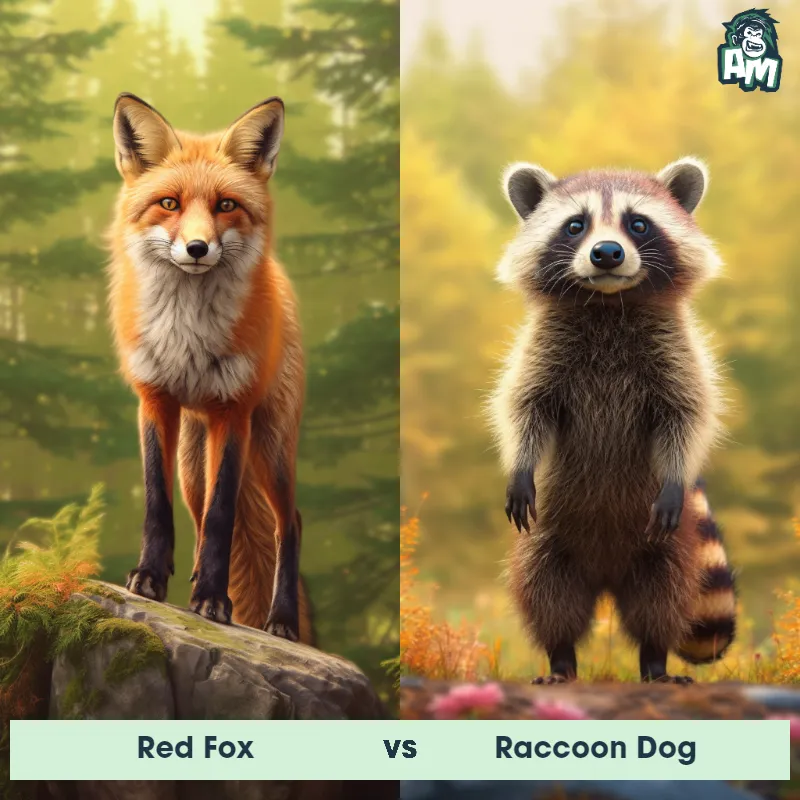The Raccoon Dog
The Raccoon Dog, also known as the tanuki or Nyctereutes procyonoides, is a medium-sized canid native to East Asia. It is named for its remarkable physical resemblance to both raccoons and dogs. The Raccoon Dog has a stocky build with short legs and a bushy tail. Its fur is long and dense, typically gray or brown, and it has distinct facial markings, including dark patches around its eyes. This animal is adept at climbing trees, swimming, and burrowing. It is primarily nocturnal and an adept scavenger, with a diet consisting of small mammals, amphibians, birds, insects, and fruits.

| Raccoon Dog | |
|---|---|
| Size | 16-28 inches (40-70 cm) in length |
| Weight | 8-20 pounds (3.5-9 kg) |
| Speed | Speed: 37 mph (60 km/hr) |
| Key Strength | Agility and sharp teeth |
| Biggest Weakness | Small size and lack of physical strength |
| Scientific Name | Nyctereutes procyonoides |
| Family | Canidae |
| Habitat | Forests, grasslands, and wetlands |
| Geography | East Asia |
| Diet | Omnivorous, eats small animals, insects, fruits, and vegetables |
| Lifespan | 6 years - 10 years |

The Raccoon Dog
The Raccoon Dog, also known as the tanuki or Nyctereutes procyonoides, is a medium-sized canid native to East Asia. It is named for its remarkable physical resemblance to both raccoons and dogs. The Raccoon Dog has a stocky build with short legs and a bushy tail. Its fur is long and dense, typically gray or brown, and it has distinct facial markings, including dark patches around its eyes. This animal is adept at climbing trees, swimming, and burrowing. It is primarily nocturnal and an adept scavenger, with a diet consisting of small mammals, amphibians, birds, insects, and fruits.
Fun Fact: Despite their name, Raccoon Dogs are not related to raccoons at all, but rather belong to the canid family, which includes dogs, foxes, and wolves.
| Raccoon Dog | |
|---|---|
| Size | 16-28 inches (40-70 cm) in length |
| Weight | 8-20 pounds (3.5-9 kg) |
| Speed | Speed: 37 mph (60 km/hr) |
| Key Strength | Agility and sharp teeth |
| Biggest Weakness | Small size and lack of physical strength |
| Scientific Name | Nyctereutes procyonoides |
| Family | Canidae |
| Habitat | Forests, grasslands, and wetlands |
| Geography | East Asia |
| Diet | Omnivorous, eats small animals, insects, fruits, and vegetables |
| Lifespan | 6 years - 10 years |
Raccoon Dog Matchups
We use AI to simulate matchups between the Raccoon Dog and other animals. Our simulation considers size, strength, and natural predatory behaviors to determine the most likely outcome.

Can't find the Matchup you want?
Create Your Own MatchupRaccoon Dog: Diet, Predators, Aggression, and Defensive Behaviors
What do Raccoon Dogs eat?
Raccoon Dogs are omnivores, meaning Raccoon Dog eat both plant and animal matter. Their diet consists of a variety of foods including insects, rodents, amphibians, berries, fruits, and even small mammals. Raccoon Dog are also known to scavenge for food in human trash or agricultural areas.
Do Raccoon Dogs have any predators?
Raccoon Dogs have a few natural predators in the wild, including large birds of prey such as eagles and owls, as well as wolves and certain species of foxes. Additionally, Raccoon Dog are sometimes hunted by humans for their fur.
Are Raccoon Dogs aggressive?
Raccoon Dogs are typically not aggressive towards humans unless Raccoon Dog feel threatened or cornered. However, Raccoon Dog can become aggressive towards other animals if Raccoon Dog feel their territory is being invaded or during mating season.
Do Raccoon Dogs fight?
Raccoon Dogs are known for their social behavior and typically use vocalizations, body language, and scent marking to communicate with one another. While Raccoon Dog may engage in minor scuffles or territorial disputes, Raccoon Dog generally avoid physical confrontation.
How do Raccoon Dogs defend themselves?
When feeling threatened, Raccoon Dogs have several defensive strategies to protect themselves. Raccoon Dog may emit a strong odor from their anal glands, puff up their fur to appear larger, emit growling or hissing sounds, and even play dead in extreme cases.
What is the biggest weakness of Raccoon Dogs in a fight?
Despite their ability to defend themselves using various tactics, Raccoon Dogs are known to be relatively small in size compared to some of their predators. This size disparity can make it challenging for them to defend against larger, more powerful predators in a physical confrontation.
Fun Fact: Raccoon Dogs are the only canids that hibernate, albeit only for short periods during the winter months when food sources are scarce.
Fun Fact: Raccoon Dogs have scent glands concentrated near their genitals, which they use for communication by marking their territories or leaving scent trails for other members of their species to follow.













